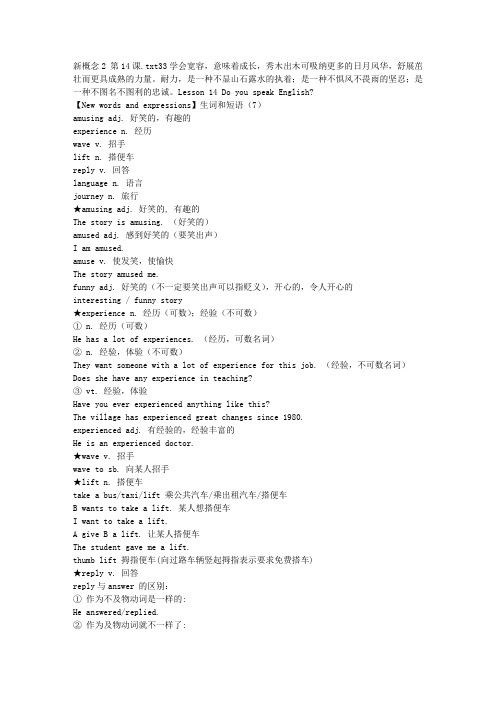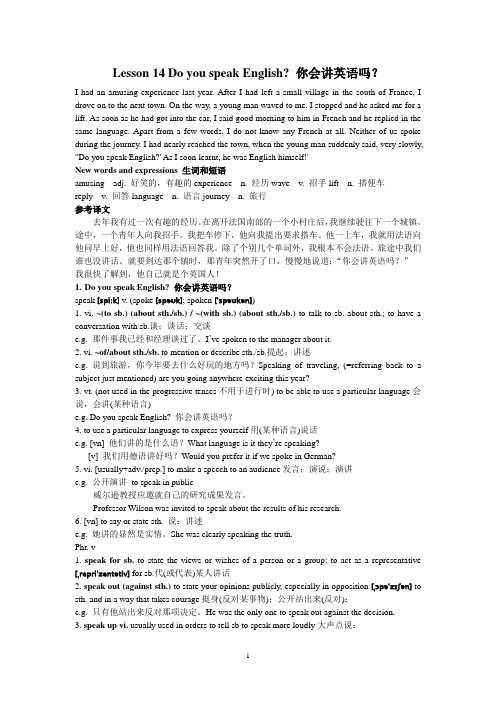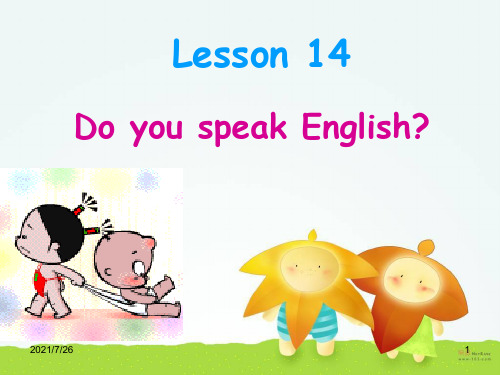(完整版)新概念英语第二册第14课
(完整版)新概念英语第二册:第14课课文详解及语法解析

新概念英语第二册:第14课课文详解及语法解析课文详注 Further notes on the text1。
After I had left a small village in the south of France, Idrove on to the next town.在离开法国南部的一个小村庄后,我继续驶往下一个城镇。
(1)表示一个大范围中的某一个地方时要用介词in:Beijing is in the north of China。
北京位于中国的北部。
(2)副词on紧跟在动词后面时能够表示“向前"、“继续下去”等意义:He talked on until everybody had gone。
他滔滔不绝地讲到大家都走了。
I was reading when my friend called。
After he had gone, I wenton to read。
我朋友来看我时我正在看书。
他走了以后我便继续看书。
2.I stopped and he asked me for a lift。
我把车停下,他向我提出要求搭车.名词lift的含义之一是“(给步行者)搭便车”、“免费搭车”:Last night, I had to walk home. No one would give me a lift.昨晚我不得不走回家。
谁也不愿意让我搭车。
I was lucky today。
I got a lift soon after I had left the village.我今天运气好,离开村子不久就搭上了便车。
3.As soon as he had got into the car, I said good morning to him in French and he replied in the same language.他一上车,我就用法语向他问早上好,他也同样用法语回答我。
新概念2 第14课

新概念2 第14课.txt33学会宽容,意味着成长,秀木出木可吸纳更多的日月风华,舒展茁壮而更具成熟的力量。
耐力,是一种不显山石露水的执着;是一种不惧风不畏雨的坚忍;是一种不图名不图利的忠诚。
Lesson 14 Do you speak English?【New words and expressions】生词和短语(7)amusing adj. 好笑的,有趣的experience n. 经历wave v. 招手lift n. 搭便车reply v. 回答language n. 语言journey n. 旅行★amusing adj. 好笑的, 有趣的The story is amusing. (好笑的)amused adj. 感到好笑的(要笑出声)I am amused.amuse v. 使发笑,使愉快The story amused me.funny adj. 好笑的(不一定要笑出声可以指贬义),开心的,令人开心的interesting / funny story★experience n. 经历(可数);经验(不可数)① n. 经历(可数)He has a lot of experiences. (经历,可数名词)② n. 经验,体验(不可数)They want someone with a lot of experience for this job. (经验,不可数名词)Does she have any experience in teaching?③ vt. 经验,体验Have you ever experienced anything like this?The village has experienced great changes since 1980.experienced adj. 有经验的,经验丰富的He is an experienced doctor.★wave v. 招手wave to sb. 向某人招手★lift n. 搭便车take a bus/taxi/lift 乘公共汽车/乘出租汽车/搭便车B wants to take a lift. 某人想搭便车I want to take a lift.A giveB a lift. 让某人搭便车The student gave me a lift.thumb lift 拇指便车(向过路车辆竖起拇指表示要求免费搭车)★reply v. 回答reply与answer 的区别:①作为不及物动词是一样的:He answered/replied.②作为及物动词就不一样了:answer sth.answer the letter 回信reply to sth.I will reply to the letter. 回信★language n. 语言native language 母语The native language is Chinese.mother tongue 母语(口语中用)My mother tongue is Chinese.★journey n. 旅行journey n. 所有的旅行,偏重于陆地旅行go on a journey2 hours' journey;3 days' journey(三天路程)trip n. 短距离旅行或出差(时间或距离上较短)go on a trip = go on businesstravel n. 周游(长途旅行)tour n. 游玩(为了玩)tourist n. 游客voyage n. 旅行(海上)flight n. 空中飞行【Text】I had an amusing experience last year. After I had left a small village in the south of France, I drove on to thenext town. On the way, a young man waved to me. I stopped and he asked me for a lift. As soon as he had got intothe car, I said good morning to him in French and he replied in the same language. Apart from a few words, I donot know any French at all. Neither of us spoke during the journey. I had nearly reached the town, when the youngman suddenly said, very slowly, "Do you speak English?' As I soon learnt, he was English himself!'参考译文去年我有过一次有趣的经历. 在离开法国南部的一个小村庄后, 我继续驶往下一个城镇. 途中, 一个青年人向我招手. 我把车停下, 他向我提出要求搭车. 他一上车, 我就用法语向他问早上好, 他也同样用法语回答我. 除了个别几个单词外, 我根本不会法语. 旅途中我们谁也没讲话. 就要到达那个镇时, 那青年突然开了口, 慢慢地说道: “你会讲英语吗?”我很快了解到, 他自己就是个英国人!【课文讲解】1、After I had left a small village in the south of France, I drove on to the next town.after 引导的从句如果一个是过去时,一个是过去完成时,那一定是从句用过去完成时;before 引导的从句表示“在……之前”,主句发生在从句之前, 主句用过去完成时。
(美音版)新概念英语第二册:Lesson 14 Do you speak English

(美音版)新概念英语第二册:Lesson 14 Do youspeak EnglishLesson 14 Do you speak English你会讲英语吗?First listen and then answer the question.听录音,然后回答以下问题。
Did the young man speak English?那个年轻人会讲英语吗?I had an amusing experience last year.去年我有过一次有趣的经历。
After I had left a small village in the south of France, I drove on to the next town.在离开法国南部的一个小村庄后,我继续驶往下一个城镇。
On the way, a young man waved to me.途中,一个青年人向我招手。
I stopped and he asked me for a lift.我把车停下,他向我提出要求搭车。
As soon as he had got into the car, I said good morning to him in French and he replied in the same language.他一上车,我就用法语向他问早上好,他也同样用法语回答我。
Apart from a few words, I do not know any French at all.除了个别几个单词外,我根本不会法语。
Neither of us spoke during the journey.旅途中我们谁也没讲话。
I had nearly reached the town, when the young man suddenly said, very slowly, 'Do you speak English?'就要到达那个镇时,那青年突然开了口,慢慢地说道:“你会讲英语吗?”As I soon learnt, he was English himself!我很快了解到,他自己就是个英国人!。
新概念英语第二册14课课文

新概念英语第二册14课课文新概念英语第二册14课课文一、课文原文It was Joe's first date with Mary. He asked her what she wanted in life and she replied, "I want to establish my career. That's the most important thing to me right now." Undeterred, Joe pursued his line of questioning. "Do you want to marry and have children?" he asked. Mary replied, "I do, but not now. In a few years, maybe." Joe asked, "What would you do if you met the man of your dreams?" Mary smiled and answered, "I'd be sure he was the man of my dreams before I committed myself. I'd want to be very sure thathe was really the right person for me. I wouldn't want to make a mistake." "Well," said Joe, "I think you've just described what a marriage is. It's making a commitment and being sure that you've found the right person."二、课文翻译约瑟夫第一次与玛丽约会。
(完整版)新概念英语第二册:第14课课文详解及语法解析

新概念英语第二册:第14课课文详解及语法解析课文详注 Further notes on the text1.After I had left a small village in the south of France, I drove on to the next town.在离开法国南部的一个小村庄后,我继续驶往下一个城镇。
(1)表示一个大范围中的某一个地方时要用介词in:Beijing is in the north of China.北京位于中国的北部。
(2)副词on紧跟在动词后面时能够表示“向前”、“继续下去”等意义:He talked on until everybody had gone.他滔滔不绝地讲到大家都走了。
I was reading when my friend called. After he had gone,I went on to read.我朋友来看我时我正在看书。
他走了以后我便继续看书。
2.I stopped and he asked me for a lift.我把车停下,他向我提出要求搭车。
名词lift的含义之一是“(给步行者)搭便车”、“免费搭车”:Last night, I had to walk home. No one would give me a lift.昨晚我不得不走回家。
谁也不愿意让我搭车。
I was lucky today. I got a lift soon after I had leftthe village.我今天运气好,离开村子不久就搭上了便车。
3.As soon as he had got into the car, I said goodmorning to him in French and he replied in the same language.他一上车,我就用法语向他问早上好,他也同样用法语回答我。
(1)表示时间的固定短语as soon as通常表示“一……就……”,即两个动词之间相隔时间非常短:Tell him the news as soon as you meet him.你一遇见他就把这消息告诉他。
新概念英语第2册课件Lesson14(共40页)

▪ Language 1)语言 ▪ speak a language,讲一门语言 ▪ a foreign language, the second language ▪ native language 母语 ▪ The native language is Chinese. ▪ mother tongue 母语(口语中用) ▪ My mother tongue is Chinese. ▪ 2)除了文字以外的传达,人造语言 ▪ body language,sign language
this job. (经验,不可数名词) ▪ Does she have any experience in teaching? ▪ ③ vt. 经验,体验 ▪ Have you ever experienced anything like this? ▪ The village has experienced great changes
Because of them thought the other was French and both of them knew little French.
Key Words and Expressions
amusing
a. 有趣的
experience
n. 经验,体验
wave
v. 挥手
ask sb. for a lift 要求搭车
▪ ★experience n. 经历(可数);经验(不可数) ▪ ① n. 经历(可数) ▪ He has a lot of experiences. (经历,可数名词) ▪ ② n. 经验,体验(不可数) ▪ They want someone with a lot of experience for
(完整版)新概念英语第二册第14课

Lesson 14 Do you speak English? 你会讲英语吗?I had an amusing experience last year. After I had left a small village in the south of France, I drove on to the next town. On the way, a young man waved to me. I stopped and he asked me for a lift. As soon as he had got into the car, I said good morning to him in French and he replied in the same language. Apart from a few words, I do not know any French at all. Neither of us spoke during the journey. I had nearly reached the town, when the young man suddenly said, very slowly, "Do you speak English?' As I soon learnt, he was English himself!'New words and expressions 生词和短语amusing adj. 好笑的,有趣的experience n. 经历wave v. 招手lift n. 搭便车reply v. 回答language n. 语言journey n. 旅行参考译文去年我有过一次有趣的经历。
在离开法国南部的一个小村庄后,我继续驶往下一个城镇。
途中,一个青年人向我招手。
我把车停下,他向我提出要求搭车。
他一上车,我就用法语向他问早上好,他也同样用法语回答我。
新概念英语第二册:第14课课文详解及语法解析

新概念英语第二册:第14课课文详解及语法解析新概念英语第二册:第14课课文详解及语法解析课文详注 Further notes on the text1.After I had left a small village in the south of France, I drove on to the next town.在离开法国南部的一个小村庄后,我继续驶往下一个城镇。
(1)表示一个大范围中的某一个地方时要用介词in:Beijing is in the north of China.北京位于中国的北部。
(2)副词on紧跟在动词后面时可以表示“向前”、“继续下去”等意义:He talked on until everybody had gone.他滔滔不绝地讲到大家都走了。
I was reading when my friend called. After he had gone, I went on to read.我朋友来看我时我正在看书。
他走了以后我便继续看书。
2.I stopped and he asked me for a lift.我把车停下,他向我提出要求搭车。
名词lift的含义之一是“(给步行者)搭便车”、“免费搭车”:Last night, I had to walk home. No one would give me a lift.昨晚我不得不走回家。
谁也不愿意让我搭车。
I was lucky today. I got a lift soon after I had left the village.我今天运气好,离开村子不久就搭上了便车。
3.As soon as he had got into the car, I said good morning to him in French and he replied in the same language.他一上车,我就用法语向他问早上好,他也同样用法语回答我。
新概念英语第二册lesson14

• South • South-南 /north-北 /east-东/west-西 • 1) n南部,南 • In the south of 在……南部(范围之内) • This is in the South of Israel. • 这是在以色列的南方。 • On the south of 在……以南(范围之外,接壤,相邻) • Hunan is on the south of HuBei. • 湖南紧邻湖北的南边。 • To the south of ……以南(隔海相望) • Mexico is to the south of the USA. • 墨西哥在美国之南方。 • 2) adj. 南面的 • The south gate of a school • 3) adv. 向南的 • Eg. Those windows face south. • Eg. Those windows face east.
• Trip n (美)包括乘短途交通工具以及徒步远足的所有旅行
•
(英)通常指短途的观光旅行
• A bus trip
• A business trip
• Take a trip
• Voyage 航海,航行,乘船旅行
• Eg. Go on a voyage around the world
• 做环游世界的旅行
• Eg. When I woke up it had already stopped raining.
• Eg. I hadn’t had any food before I came here.
• Eg. She didn’t go to bed until she had finished her work.
新概念英语第二册Lesson14共41页课件

2021/7/26
23
7. -Have you ever______Lintong to see the Terra Cotta Warriors?
-Yes, I have. • went to B. gone to C. been in D. been to 8. My parents ______ Shangdong for ten years. • have been in B. have been to C. have gone to D. have
9
By the end of……
2006
2011
learn 4000 English words
By the end of 2006, I had 2021/7/26 learned 4000 new words. 10
The Past Perfect Tense 过去完成时
• 过去完成时的构成
By the time the policeman got to the shop, Tom had run away.
2021/7/26
7
Speaking--freely : By the time… or
When…
the concert be over Liu Mei wake up
By the time Liu Mei woke up,
2.a.I ran outside to the bus stop. The bus was gone. b. By the time I ran outside to the bus stop, the bus had already gone.
3.a.I got home. I realized that my homework was still at school. b. When I got home,I realized that I had left my homework at school.
新概念英语第二册Lesson14 Do you speak English

hadwritten 5.By yesterday evening he _______________
that important letter.(write)
2.a.I ran outside to the bus stop. The bus was gone. b. By the time I ran outside to the bus stop, the bus had already gone.
3.a.I got home. I realized that my homework was still at school. b. When I got home,I realized that I had left my homework at school.
broken spoken driven seen eaten
given known grown
1. We h_a_d__le_a_r_n_e_d__(learn) two thousands words by the time I went to Middle School.
2. I ___h_a_d_k_n_o_w__n (know) him when I was a student. 3. When we __a_rr_i_v_e_d(arrive) at the station, they _h_a_d__w_a_it_e_d_(wait) for more than twenty minutes.
The Past Perfect Tense 过去完成时
- 1、下载文档前请自行甄别文档内容的完整性,平台不提供额外的编辑、内容补充、找答案等附加服务。
- 2、"仅部分预览"的文档,不可在线预览部分如存在完整性等问题,可反馈申请退款(可完整预览的文档不适用该条件!)。
- 3、如文档侵犯您的权益,请联系客服反馈,我们会尽快为您处理(人工客服工作时间:9:00-18:30)。
Lesson 14 Do you speak English?
▪ New words and expressions
▪ 1. amuse (v.) 逗…笑
▪ amuse sb.
▪ The interesting story amused all of us的
▪
(n.) 回复;答复
▪ I haven’t received a reply yet.
▪ 6. language (n.) 语言 ▪ ☺ native language/mother tongue ▪ ☺ a second/foreign language ▪ ☺ the English language=English ▪ ☺ language learner
▪ I had an amusing experience last year. ▪ ☺ have an experience ▪ ☺ amusing= interesting ▪ After I had left a small village in the south of
France, I drove on to the next town. ▪ ☺ in the south of France ▪ =in Southern France ▪ ☺ v.+ on 继续做… ▪ They talked on after the meeting. ▪ ☺drive on to sp. 继续开往… ▪ We drove on to London after having lunch in
▪ an amusing movie
▪ 2. experience (c.n.) 经历
▪ have an amusing/unpleasant experience
▪
(u.n.) 经验;体验
▪ learn by experience
▪ 从经验中学习
▪ enough working experience
▪ Apart from a few words, I do not know any French at all.
▪ ☺ apart from= except for(句首) ▪ ☺ except(句中) ▪ Apart from/Except for Mike, everyone’s
▪ ☺ wave (n.) 海浪;浪头
▪ a huge wave
▪ 大浪
▪ 4. lift (v.)抬起;举起
▪ lift a boy /lift a box
▪
(n.) ①电梯
▪ take a lift
▪ 搭电梯
▪
②顺路车;顺风车;搭便车
▪ ☺ give sb. a lift
▪ ☺ ask sb. for a lift
▪ As soon as he had got into the car, I said good morning to him in French and he replied in the same language.
▪ ☺ as soon as … 一…就… ▪ The phone rang loudly as soon as he
road. ▪ I stopped and he asked me for a lift. ▪ ☺ I stopped=I stopped my car ▪ ☺ ask sb. for a lift ▪ Tom asked me for a lift to the train station
this morning.
▪ 要求搭便车
▪ The poor man asked me for a lift.
▪ 5. reply (v.) 回复;答复
▪ He replied that he was busy.
▪ ‘Certainly not,’ he replied.
▪ ☺ reply with sth. 以…回答
▪ He replied with a nod.
▪ 7. journey (n.) (陆地)旅行 ▪ Did you have a good journey? ▪ ☺ go on a long train journey ▪ ☺ the journey from Liaoning to Jilin ▪ ☺ journey/trip/tour/voyage/travel
▪ Sally was amused, but I was embarrassed!
▪ ★be amused by sb./at sth.
▪
被…逗笑
▪
I was amused by the clown.
▪
He was amused at the news.
▪ amusing (adj.) (修饰物)好笑的,有趣的
the small cafe.
▪ On the way, a young man waved to me. ▪ ☺ on the way/by the way/in the way ▪ in a way/in this way ▪ ☺ wave to/at sb. ▪ A young girl waved to me by the side of the
opened the door. ▪ ☺ get into the car / get on the bus ▪ ☺ get out of the car / get off the bus ▪ ☺ say good morning/hello/goodbye to sb. ▪ ☺ in+ 语言 ▪ She made her speech in English. ▪ ☺ reply=answer ▪ ☺ in the same language=in French
▪ experienced (adj.)有经验的;经验丰富的
▪ an experienced nurse/driver
▪ 3. wave (v.) ①挥手;摆手;招手
▪ ☺ wave at/to sb.
▪ That policeman’s waving to you.
▪
②飘动;摆动;摇动
▪ The flag is waving in the wind.
